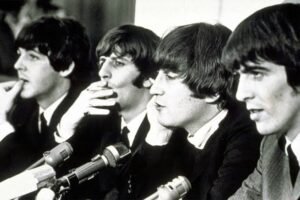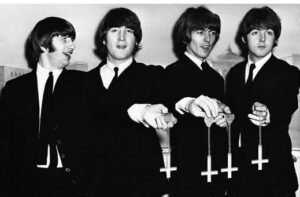
Absolutely — John Lennon’s life and legacy extend far beyond his role as co-founder of The Beatles. His contributions to music, activism, and culture have left an indelible mark on the world. Here’s a full 900-word essay that explores the profound impact of John Lennon:
John Lennon: Musician, Messenger, and Modern Icon
John Lennon was more than just a rock star—he was a symbol of a generation seeking truth, peace, and transformation. As the co-founder of The Beatles, Lennon helped shape the landscape of 20th-century music, introducing sounds and ideas that revolutionized pop culture. Yet his influence transcended melody and fame. Lennon used his platform to promote peace, challenge authority, and inspire millions to think differently about the world they lived in. His life remains a compelling example of how music and message can intersect to powerful effect.
Born on October 9, 1940, in Liverpool, England, John Winston Lennon grew up during wartime, raised largely by his Aunt Mimi. As a teenager, Lennon showed early signs of rebellious creativity. He formed his first band, The Quarrymen, in 1956—a precursor to what would become The Beatles. When Paul McCartney joined the group a year later, the partnership ignited a songwriting powerhouse that would change history. Together, Lennon and McCartney became one of the most successful and influential songwriting duos of all time, producing a staggering catalog of hits that redefined music.
The Beatles’ journey from Liverpool clubs to global superstardom is the stuff of legend. Lennon, with his sharp wit, artistic restlessness, and emotional honesty, stood out as the philosophical heart of the group. While McCartney often gravitated toward melodic optimism, Lennon was unafraid to confront darker or more abstract themes. Songs like “Nowhere Man,” “Help!,” and “In My Life” explored vulnerability and existential angst—rare territory for mainstream pop music at the time.
Even as The Beatles captured the world’s imagination, Lennon increasingly began to channel his voice into social commentary. The late 1960s were a period of global upheaval—war, civil rights movements, and cultural revolutions. Lennon responded not with silence, but with songs. His desire to promote peace and justice found its most resonant expression in “Revolution” (1968), a track that dared to question violence as a means of protest.

After The Beatles disbanded in 1970, Lennon’s solo career became even more politically charged and introspective. His debut solo album, John Lennon/Plastic Ono Band, stripped away the pop polish to reveal raw emotion, as seen in haunting tracks like “Mother” and “Working Class Hero.” But it was his 1971 anthem “Imagine” that would cement his legacy as a universal spokesman for peace.
“Imagine” remains one of the most enduring songs of all time. Its lyrics, envisioning a world without borders, religion, or possessions, were radical in their simplicity. Lennon’s piano-driven plea for unity challenged listeners to reimagine the foundations of society. The song became a cultural touchstone—played at vigils, protests, and peace gatherings around the world.
Beyond his music, Lennon made headlines for his outspoken activism. Alongside his wife and artistic partner Yoko Ono, he staged “Bed-Ins for Peace” during the Vietnam War, inviting media to their hotel room to discuss global conflict rather than celebrity gossip. His confrontations with authority became more serious when he moved to the United States. The Nixon administration viewed him as a threat and attempted to deport him—a legal battle that dragged on for years. Lennon fought back with humor and resilience, ultimately winning the right to stay in America.
Despite the turmoil, Lennon never gave up on his ideals. He saw music as more than entertainment—it was a vehicle for truth and transformation. His later works, such as “Mind Games” and “Give Peace a Chance,” continued to promote pacifism and introspection. Yet he also embraced domestic life, stepping away from the spotlight in the mid-1970s to raise his son, Sean.
In 1980, Lennon returned to music with Double Fantasy, an album that celebrated love and renewal. Tragically, just weeks after its release, he was shot and killed outside his New York apartment by a disturbed fan. His death shocked the world and robbed us of a voice that still had so much to say.
Yet Lennon’s legacy endures. His music continues to inspire artists and activists alike. Streets bear his name. Memorials honor his message. Every year on his birthday, fans gather in places like Strawberry Fields in New York’s Central Park to remember his life and vision. His belief that “all you need is love” may sound simple, but in a fractured world, it remains a powerful reminder of what really matters.
John Lennon wasn’t perfect—he was complex, contradictory, and evolving. But perhaps that’s what made him so relatable. He wasn’t just preaching ideals from a pedestal; he was grappling with them himself. Whether as a Beatle, a solo artist, a father, or an activist, he invited the world into his journey, flaws and all.
In the end, Lennon’s impact lies not just in his catalog of unforgettable songs, but in the courage he had to imagine a better world—and the clarity with which he used his platform to pursue it. His life proves that music, when infused with sincerity and vision, can do more than entertain. It can challenge, connect, and ultimately, change the world.
Absolutely — John Lennon’s life and legacy extend far beyond his role as co-founder of The Beatles. His contributions to music, activism, and culture have left an indelible mark on the world. Here’s a full 900-word essay that explores the profound impact of John Lennon:
John Lennon: Musician, Messenger, and Modern Icon
John Lennon was more than just a rock star—he was a symbol of a generation seeking truth, peace, and transformation. As the co-founder of The Beatles, Lennon helped shape the landscape of 20th-century music, introducing sounds and ideas that revolutionized pop culture. Yet his influence transcended melody and fame. Lennon used his platform to promote peace, challenge authority, and inspire millions to think differently about the world they lived in. His life remains a compelling example of how music and message can intersect to powerful effect.
Born on October 9, 1940, in Liverpool, England, John Winston Lennon grew up during wartime, raised largely by his Aunt Mimi. As a teenager, Lennon showed early signs of rebellious creativity. He formed his first band, The Quarrymen, in 1956—a precursor to what would become The Beatles. When Paul McCartney joined the group a year later, the partnership ignited a songwriting powerhouse that would change history. Together, Lennon and McCartney became one of the most successful and influential songwriting duos of all time, producing a staggering catalog of hits that redefined music.
The Beatles’ journey from Liverpool clubs to global superstardom is the stuff of legend. Lennon, with his sharp wit, artistic restlessness, and emotional honesty, stood out as the philosophical heart of the group. While McCartney often gravitated toward melodic optimism, Lennon was unafraid to confront darker or more abstract themes. Songs like “Nowhere Man,” “Help!,” and “In My Life” explored vulnerability and existential angst—rare territory for mainstream pop music at the time.

Even as The Beatles captured the world’s imagination, Lennon increasingly began to channel his voice into social commentary. The late 1960s were a period of global upheaval—war, civil rights movements, and cultural revolutions. Lennon responded not with silence, but with songs. His desire to promote peace and justice found its most resonant expression in “Revolution” (1968), a track that dared to question violence as a means of protest.
After The Beatles disbanded in 1970, Lennon’s solo career became even more politically charged and introspective. His debut solo album, John Lennon/Plastic Ono Band, stripped away the pop polish to reveal raw emotion, as seen in haunting tracks like “Mother” and “Working Class Hero.” But it was his 1971 anthem “Imagine” that would cement his legacy as a universal spokesman for peace.
“Imagine” remains one of the most enduring songs of all time. Its lyrics, envisioning a world without borders, religion, or possessions, were radical in their simplicity. Lennon’s piano-driven plea for unity challenged listeners to reimagine the foundations of society. The song became a cultural touchstone—played at vigils, protests, and peace gatherings around the world.
Beyond his music, Lennon made headlines for his outspoken activism. Alongside his wife and artistic partner Yoko Ono, he staged “Bed-Ins for Peace” during the Vietnam War, inviting media to their hotel room to discuss global conflict rather than celebrity gossip. His confrontations with authority became more serious when he moved to the United States. The Nixon administration viewed him as a threat and attempted to deport him—a legal battle that dragged on for years. Lennon fought back with humor and resilience, ultimately winning the right to stay in America.
Despite the turmoil, Lennon never gave up on his ideals. He saw music as more than entertainment—it was a vehicle for truth and transformation. His later works, such as “Mind Games” and “Give Peace a Chance,” continued to promote pacifism and introspection. Yet he also embraced domestic life, stepping away from the spotlight in the mid-1970s to raise his son, Sean.
In 1980, Lennon returned to music with Double Fantasy, an album that celebrated love and renewal. Tragically, just weeks after its release, he was shot and killed outside his New York apartment by a disturbed fan. His death shocked the world and robbed us of a voice that still had so much to say.
Yet Lennon’s legacy endures. His music continues to inspire artists and activists alike. Streets bear his name. Memorials honor his message. Every year on his birthday, fans gather in places like Strawberry Fields in New York’s Central Park to remember his life and vision. His belief that “all you need is love” may sound simple, but in a fractured world, it remains a powerful reminder of what really matters.
John Lennon wasn’t perfect—he was complex, contradictory, and evolving. But perhaps that’s what made him so relatable. He wasn’t just preaching ideals from a pedestal; he was grappling with them himself. Whether as a Beatle, a solo artist, a father, or an activist, he invited the world into his journey, flaws and all.
In the end, Lennon’s impact lies not just in his catalog of unforgettable songs, but in the courage he had to imagine a better world—and the clarity with which he used his platform to pursue it. His life proves that music, when infused with sincerity and vision, can do more than entertain. It can challenge, connect, and ultimately, change the world.
Leave a Reply